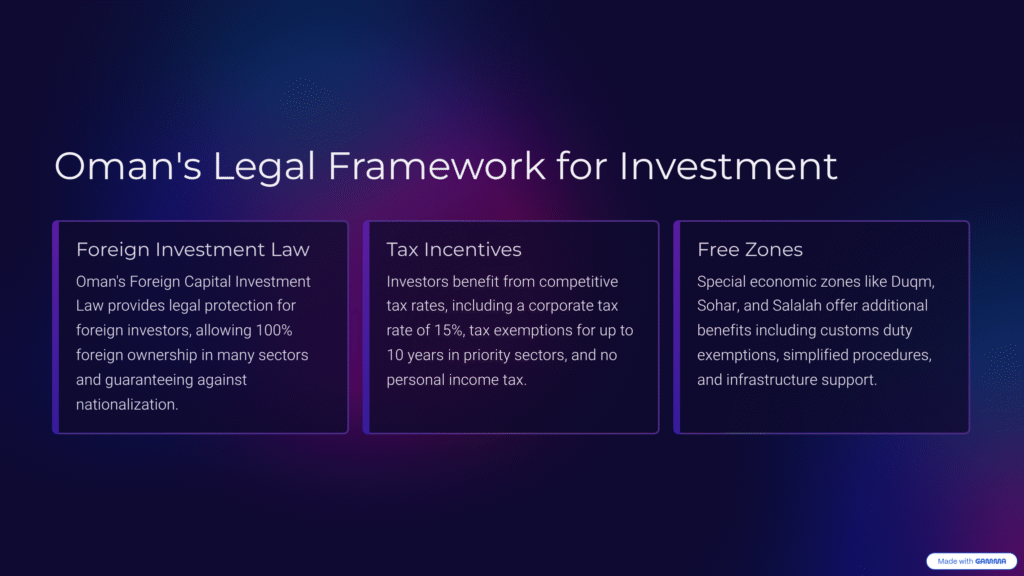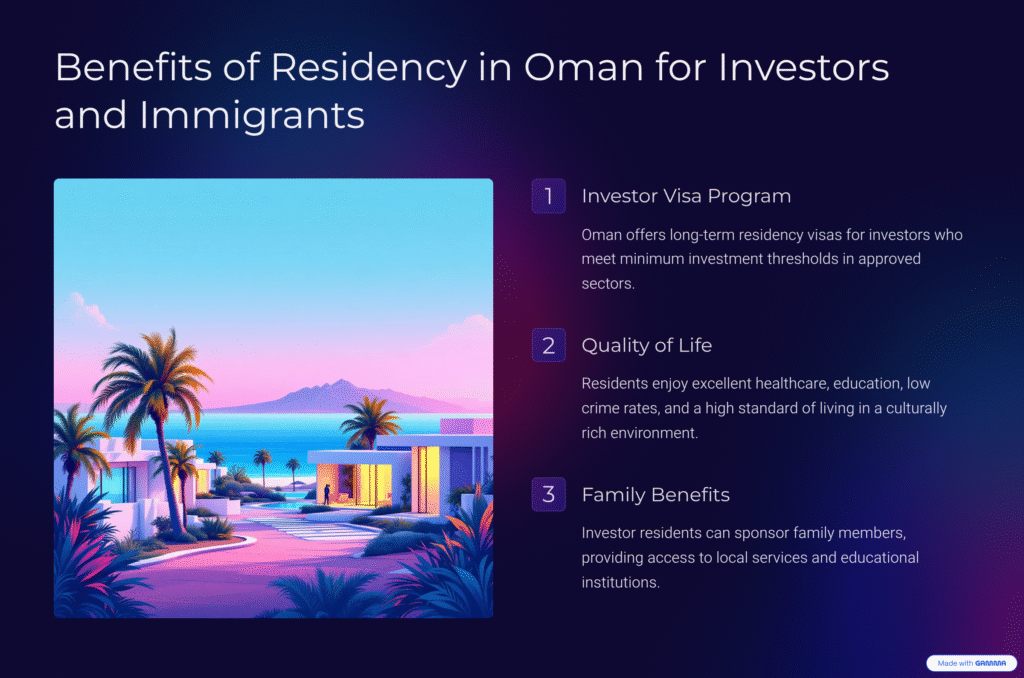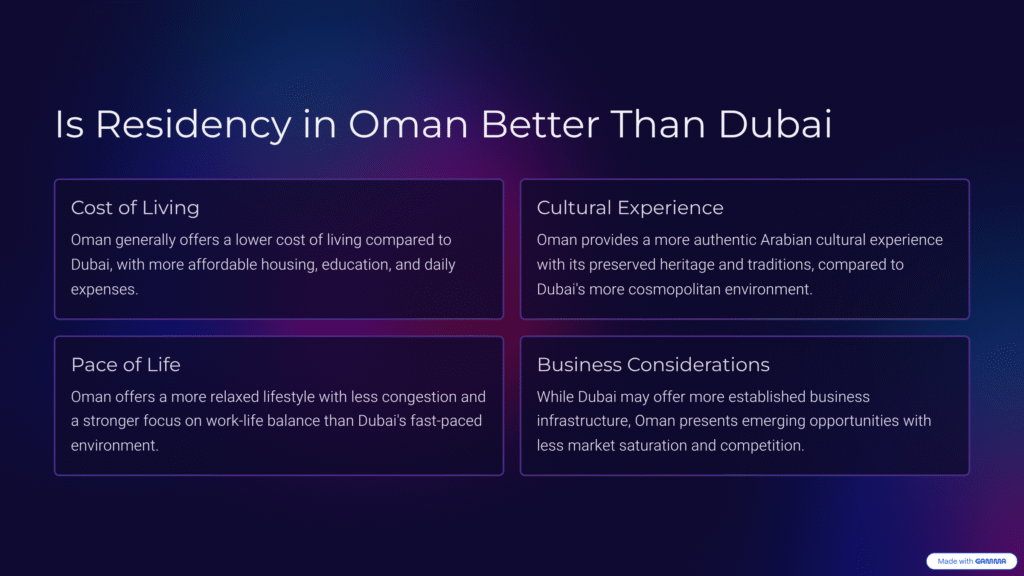Investment laws in Oman is recognized as an attractive option for foreign investors due to its economic and political stability, strong currency (Omani Rial), and strategic location in the Persian Gulf.
Among the main methods of investment in this country are company registration, property purchase in government-designated areas, and the purchase of government bonds, which—based on the conditions of investment residency in Oman—can lead to obtaining a 5- or 10-year residency permit. However, it is important to note that Oman does not offer permanent residency or citizenship to investors.
Among the key advantages of investing in Oman are tax exemptions, extensive opportunities in the fields of oil and gas, tourism, real estate, and technology, as well as a balanced cost of living. However, the investment laws in Oman include limitations on property ownership and the absence of citizenship offers, and potential effects of sanctions should also be taken into consideration.
If you are seeking more information about Oman residency conditions, how to obtain residency through investment, and the legal details involved, you can contact the experienced consultants at Flamingo Immigration Agency and benefit from a free initial consultation.
Why Should You Consider Investing in Oman in 2025?

Investment in Oman is attractive to foreign investors especially Iranians for several reasons. One of the main incentives for entering this market is the investment residency conditions in Oman, which include obtaining a 5- or 10-year residency permit. In addition, Oman’s investment laws, by offering tax exemptions, allowing 100% foreign ownership of companies in certain free zones, and providing government support, have made investment both easy and profitable.
On the other hand, Oman’s residency conditions allow investors to operate in a stable and growing economy with a strategic location in the Persian Gulf. The diverse opportunities in sectors such as oil and gas, tourism, real estate, agriculture, technology, and startups have made Oman an ideal destination for investment.
🔹 “Oman’s investor residency programs and supportive laws create a welcoming environment for foreign investors.” (timesofoman.com)
What Are the Key Investment Conditions in Oman
To invest in Oman, applicants must meet certain initial requirements. These conditions include having sufficient financial means to invest and cover the living expenses of themselves and their family, having no criminal record, being at least 21 years old, and holding a valid passport. Meeting these criteria is one of the main prerequisites for obtaining investor residency in Oman.
Understanding Oman’s GDP and Economic Growth Indicators
The Gross Domestic Product (GDP) rate is one of the key economic indicators that reflects the health of a country’s economy. According to reports, Oman’s GDP has shown an upward trend until 2021, indicating the dynamism and growth of the country’s economy. This is an important factor in evaluating investment laws in Oman and its appeal to foreign investors.
What Is the Minimum Age to Invest in Oman Legally
According to Oman’s investment laws, the minimum age to begin investing in the country is 21. Investors must take this into account to comply with the conditions for investor residency in Oman and successfully obtain a residence permit.
read more:
Investment in Oman’s Capital Market
How Much Capital Do You Need to Start Investing in Oman
The required amount for investment in Oman varies depending on the type of activity chosen. To select the best investment method, investors must first determine the type of investment and then assess the required capital based on that. Adhering to this is important for meeting residency conditions and benefiting from the advantages of investing in Oman.
Top Considerations Before Investing in Oman as a Foreigner
To succeed in investing and benefit from Oman’s investor residency program, special attention must be paid to financial information, GDP rates, and relevant laws. Additionally, seeking legal and financial advice can be helpful along the way.
Complete Guide to Oman’s Investment Laws and Legal System

Investing in Oman requires full familiarity with the country’s investment laws and legal frameworks. One of the attractive options for investors is participating in the Oman stock exchange, particularly the Muscat Stock Exchange, which is considered one of the most stable exchanges in the region. This exchange offers well-regulated laws and transparent access to information, creating a good opportunity for profit.
For investors intending to conduct business and invest in Oman, familiarity with the following laws is essential:
• Foreign Capital Investment Law (FCIL): This law defines the general framework for foreign investment in Oman and protects investors’ rights.
• Commercial Companies Law (CCL): Specifies different business structures, licensing procedures, and company operations.
• Civil Transactions Law: This fundamental law, passed in 2013, governs all civil and commercial transactions in Oman.
• Labor Law: Defines the conditions for employing Omani and foreign workers.
• Income Tax Law (ITL): Regulates taxation for various types of businesses and investments.
How to Get Business and Investment Licenses in Oman
Investors and entrepreneurs must first obtain the necessary licenses from the Ministry of Commerce and Industry and other relevant authorities before starting economic activity in Oman. Holding these licenses is part of the requirements for obtaining investor residency in Oman, and without them, it is not possible to legally begin operations. The expert team at Flamingo Immigration Institute will support you through all stages from obtaining licenses to launching your business.
All You Need to Know About Investment Laws in Oman
To begin economic activity in the country, both Omani and foreign investors must act in accordance with the investment laws in Oman. Based on government regulations, personal eligibility must be verified before any steps are taken to register a company or launch a business.
Key Legal Requirements for Registering a Business in Oman
To establish an institution or company in Oman, the following conditions must be met:
• The applicant must be at least 18 years old.
• Non-Omani and non-GCC nationals cannot register sole proprietorships.
• The registration application must be submitted before reserving the business name.
• The applicant must have valid identification (copy of national ID) and the ability to sign documents.
These laws are part of the investor residency requirements in Oman and have a direct impact on the issuance of residency permits for investors.
Types of Legal Entities Allowed for Investors in Oman
According to Oman’s investment laws, applicants can choose one of the following legal structures to start their business:
Legal Structure Type | Description |
Sole Proprietorship | Only registrable by Omani or GCC nationals |
Branch of a Foreign Company | Requires government licensing and official registration |
Joint Venture Company | Suitable for partnerships with local investors |
Limited Liability Company (LLC) | The most commonly used structure by foreign investors |
Closed Joint-Stock Company | Intended for large-scale and industrial projects |
What’s New in Oman’s Foreign Investment Laws
One of Oman’s most significant economic reforms in the past decade relates to foreign investment regulations. In 2022, the Omani government revised its executive bylaws to facilitate the entry of foreign investors.
According to the new laws:
• Foreign investors can own 100% of companies in many sectors.
• The requirement for minimum initial capital to start a business has been eliminated.
• Investors benefit from extensive tax exemptions.
• Opportunities to operate in new economic and industrial sectors have been made available.
These reforms are part of the Omani government’s development programs under the leadership of Sultan Haitham bin Tariq, aimed at increasing foreign investment and expanding job opportunities. These changes have made it easier for investors to meet the residency requirements in Oman.
Benefits of Obtaining Residency in Oman Through Investment

Residency in Oman offers numerous advantages, making the country one of the most popular destinations for migration and investment. From high security to a stable economy and reasonable living costs, all these factors contribute to strengthening the conditions for obtaining residency in Oman.
How Safe Is Oman for Long-Term Investors
Oman is one of the safest countries in the Middle East, with a low crime rate. This feature has made many families and foreign investors choose Oman as a place to live or work.
What Job Opportunities Exist for Skilled Expats
In addition to investment, Oman’s job market offers many opportunities for foreign professionals. Especially in sectors such as energy, healthcare, technology, and construction, there are employment possibilities with good salaries.
Cost of Living for Foreign Investors in Oman
Unlike neighboring countries like the UAE or Qatar, the cost of living in Oman is more affordable. This is particularly important for immigrants seeking long-term residency.
Access to World-Class Healthcare and Education
Oman has advanced hospitals, clinics, and educational centers. Many of these institutions meet international standards, making them a reassuring choice for families.
Is Visa-Free Travel Possible With Omani Residency
One of the key benefits of Oman’s residency conditions is the ability to travel freely to GCC countries such as the UAE, Qatar, Kuwait, and Bahrain without a visa.
How Stable Is Oman’s Economy for Investors
Thanks to its oil and gas reserves and economic reforms, Oman is considered a stable country for investment and trade. This is an important incentive for benefiting from investment-based residency conditions in Oman.
Cultural Integration and Language Considerations
The cultural similarities between Oman and Iran, along with Arabic being the official language which has linguistic similarities with Persian make it easier for Iranian immigrants to adapt.
Work Visa Requirements for Foreign Investors in Oman
To work in Oman, you must obtain a work visa. Key conditions include:
• Having an official job offer from a reputable company or employer in Oman
• Legal age between 21 and 60 years
• Relevant work experience and a valid academic degree
• Proficiency in Arabic or English
Work migration can also serve as an initial step toward obtaining temporary residency and later exploring investment opportunities in Oman.
General Eligibility for Work Migration to Oman
Work migration to Oman is a popular pathway for individuals seeking to live and work in a country with economic and social stability. Those intending to obtain residency in Oman through this route should first become familiar with its general requirements.
Required Documents for Obtaining a Work Visa
To apply for a work visa in Oman, the following conditions must be met:
• Job Offer: The Omani employer must obtain a labor permit for you from the Ministry of Manpower in Oman.
• Legal Age: Applicants must be between 21 and 60 years old.
• Work Experience: Typically, a minimum of 3 years of experience related to the job is required.
• Educational Qualification: You must present a degree relevant to the position.
• Language Skills: Proficiency in English or Arabic is essential for many jobs.
• Police Clearance Certificate: This must be issued by legal authorities in the applicant’s home country.
• Medical Examinations: The applicant must undergo a medical check and obtain a health certificate.
• Identification Documents: A copy of the passport and other ID documents is mandatory.
• Administrative Fees: The applicant must pay the official visa processing fees.
• Temporary Residency: After arriving in Oman and starting work, issuing a temporary residency card is necessary.
These are part of the residency conditions in Oman for foreign workers.
Step-by-Step Guide to Getting a Work Visa in Oman
The process of obtaining a work visa for Oman involves the following step-by-step stages:
Step | Description |
1. Finding an Employer | Identifying a company in Oman that is willing to offer a job. |
2. Receiving a Job Offer | The employer sends an official job offer to the applicant. |
3. Work Permit | The employer obtains a permit from the Ministry of Manpower in Oman. |
4. Completing Forms | The applicant completes and submits the work visa application along with required documents. |
5. Paying Fees | Paying the administrative fees for the issuance of the work visa. |
6. Visa Issuance | If approved, the visa is issued and the applicant can enter Oman. |
Methods of Investment in Oman
Investment in Oman is considered an attractive path for many individuals seeking temporary residency and access to the country’s economic opportunities. However, unlike some countries, Oman’s residency policies are structured in a way that does not grant permanent residency or citizenship to investors. Investment in Oman is primarily aimed at business activity and acquiring 5- or 10-year residencies.
The main methods of investment in Oman include:
• Purchasing property in designated zones
• Registering a commercial company with partial or full ownership
• Investing in and purchasing industrial warehouses
• Engaging in export and import activities
Each of these paths, depending on the amount of invested capital, allows the investor to obtain temporary residency.
Investment Residency Conditions in Oman and Required Capital
To obtain temporary residency in Oman through investment, two levels of investment are defined:
Type of Residency | Required Investment Amount | Methods |
5-year residency | Minimum OMR 250,000 | Company registration, property purchase, or government bonds |
10-year residency | Minimum OMR 500,000 | Same methods with higher capital |
These residencies are issued as renewable and grant certain residency rights in the country; however, permanent residency or citizenship is still not granted to investors.
Step-by-Step Process for Making an Investment in Oman
For a successful investment in Oman, it is essential to follow Oman’s investment laws and complete the following steps:
• Market research and selecting the right sector: Study existing markets (oil & gas, tourism, technology, real estate, etc.) and choose the target sector.
• Choosing the investment method: Decide to invest through company registration, property purchase, or government bonds.
• Obtaining legal permits: Acquire the necessary licenses from the Ministry of Commerce, Industry, or Oman Investment Authority.
• Company registration or official property purchase: Formally register the company or complete property ownership transfer.
• Opening a bank account: Open an official bank account to manage financial transactions and support the project.
• Starting the investment and business activity: Begin implementing the project or economic activity after completing legal procedures.
• Obtaining temporary residency in Oman: Based on the type and value of the investment, a renewable temporary residency will be granted.
• Paying taxes and complying with regulations: The investor must follow the country’s commercial and tax laws.
Documents Needed to Apply for an Investment Visa
One of the crucial stages in the immigration process to Oman through investment is preparing the necessary documents. According to Oman’s investment laws, applicants must provide the following documents to apply for an investment visa:
• Valid passport with at least 6 months validity
• Personal identification documents (national ID or equivalent)
• Passport-sized photo
• Business registration documents and company articles of association (for legal entities)
• Work permit certificate issued by the Ministry of Manpower with investor’s stamp
• Bank statement or proof of financial capability
• Identification documents of all shareholders (in case of group investment or company registration)
These documents are part of Oman’s investment residency requirements. Additional documents may be requested based on each applicant’s case or investment type.
How Long Does It Take to Get Residency in Oman
According to Flamingo’s experience, the estimated time to obtain Omani residency is typically between 20 to 30 business days. Factors such as public holidays, bureaucratic procedures, changes in regulations, or case load may affect this timeframe.
Oman vs. Dubai: Which Is Better for Residency and Investment

From a residency standpoint, both countries offer attractive opportunities for investors. However, Oman’s residency conditions are more affordable in terms of lifestyle, lower city congestion, and cost of living compared to Dubai. Muscat, the capital of Oman, features a more traditional architectural style and does not focus heavily on building towers and skyscrapers like Dubai. This can be ideal for those seeking peace and a natural environment.
How to Secure Permanent Residency in Oman via Investment
To receive investment residency in Oman, the applicant must follow Oman’s investment laws, choose one of the eligible methods such as company registration, property purchase, or investing in industrial warehouses through Flamingo, and provide the required capital. By meeting Oman’s investment residency criteria, submitting the mentioned documents, obtaining legal permits, and paying the necessary fees, the individual can acquire a 5 or 10 year renewable residency.
Flamingo Immigration Institute will support you throughout the process to help you obtain residency in Oman through investment. To get started, simply fill out the form and enjoy a free consultation.

